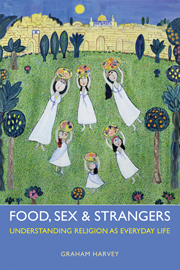Book contents
- Frontmatter
- Dedication
- Contents
- Preface
- 1 Of god and goats
- 2 Religioning elsewhere
- 3 Christianity is not a religion
- 4 Talking like a pirate
- 5 Real world
- 6 Doing violence with impunity
- 7 Respecting relations
- 8 Things full of meaning
- 9 Purity and pilgrimages
- 10 Enchantment and emplacement
- 11 Christians do religion like other people
- 12 Religion is etiquette in the real world
- Bubliography
- Index
2 - Religioning elsewhere
- Frontmatter
- Dedication
- Contents
- Preface
- 1 Of god and goats
- 2 Religioning elsewhere
- 3 Christianity is not a religion
- 4 Talking like a pirate
- 5 Real world
- 6 Doing violence with impunity
- 7 Respecting relations
- 8 Things full of meaning
- 9 Purity and pilgrimages
- 10 Enchantment and emplacement
- 11 Christians do religion like other people
- 12 Religion is etiquette in the real world
- Bubliography
- Index
Summary
Among the Maori community of Ngati Uepohatu, originating in and around Ruatoria (in Aotearoa), according to Te Pakaka Tawhai, “the purpose of religious activity here is to … do violence with impunity” ([1988] 2002: 244). Tawhai discusses speeches made about the deeds and attributes of deities and ancestors, but in writing about “Maori religion” he uses the word “belief” only once. Then he only says something about the equally ill-fitting word “myth” in relation to his people's “ancient explanations” of the world, which fluidly and performatively inform debates leading to decision-making about present concerns. Instead of presenting religion as an engagement with transcendence, Tawhai evokes a world in which religious activities occur when people chop down trees and dig up kumara (sweet potatoes). These acts of intimate violence, or violent acts of intimacy, are required if people are to build houses and cook food to shelter and feed guests. In turn, these acts continue the processes of evolution and genealogy. But this is to get ahead of the argument. Chapter 6 will focus on Maori and other Oceanic religious activities, and the technical terms learnt from them without which it is hard to imagine how anyone could speak about major social processes in other human cultures.
In this chapter I present some of the data – facts about religion(s) – that ought to be considered as we seek to define “religion” in a way that does justice to people's lives. Some of these facts are commonplace and well known. Others are commonplace and ignored in a lot of academic theorizing and even in basic descriptions of religions.
- Type
- Chapter
- Information
- Food, Sex and StrangersUnderstanding Religion as Everyday Life, pp. 23 - 42Publisher: Acumen PublishingPrint publication year: 2013



